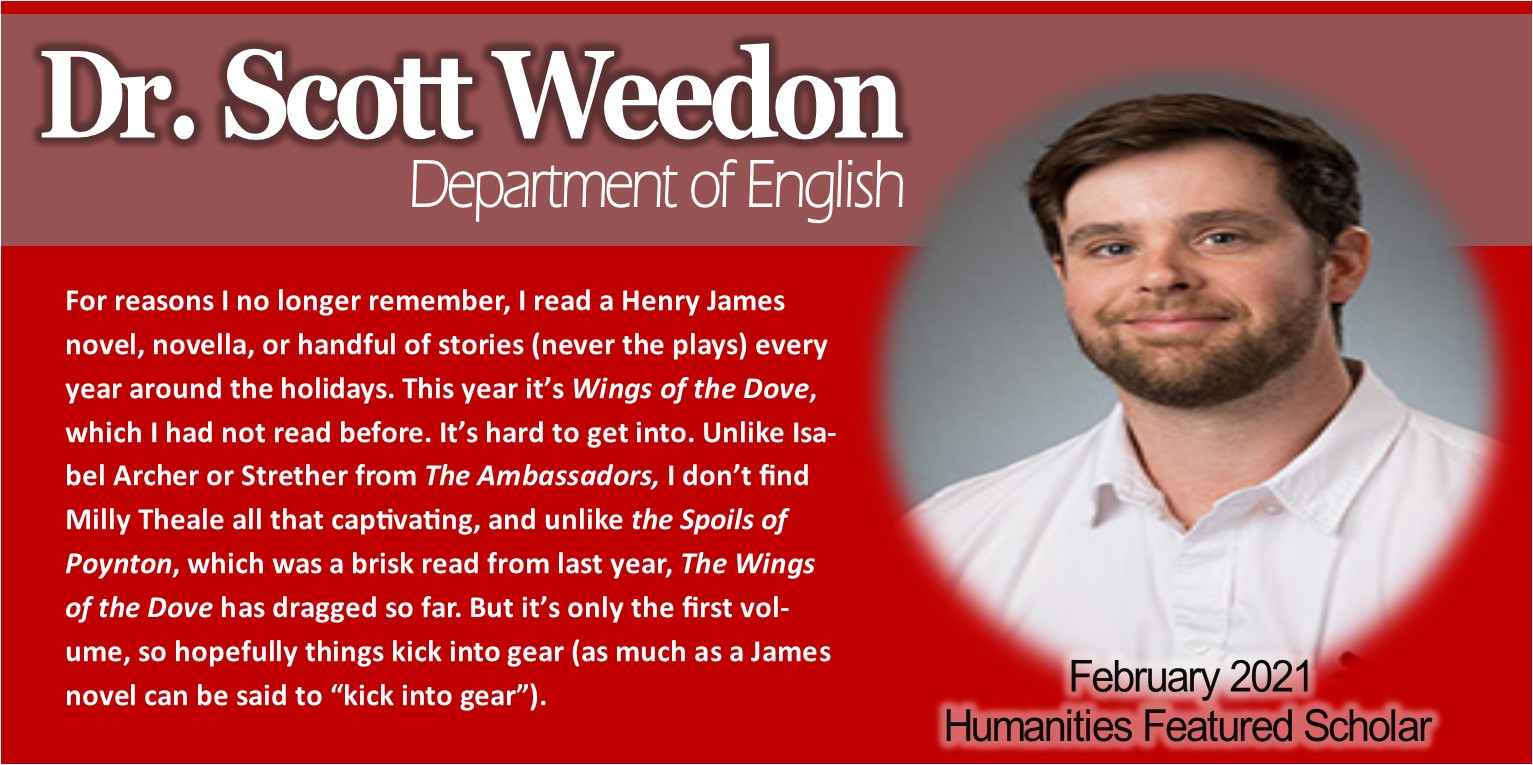Featured Scholar February 2021

What are you watching/streaming?
I haven't been watching anything new. I'm afraid to get too caught up in anything,
so I tend to watch things that require little time or that I've already seen. I've
missed about 80% of the prestige television of the last decade.
I content myself with Jeopardy and The Simpsons reruns. I do watch The Simpsons dubbed into French, though, because I am currently learning the language, so that's new.
What games are you playing?
My girlfriend got a Nintendo Switch for Xmas due to a bout of nostalgia for video
games. I play Mario Tennis, and I'm pretty good, but I cannot beat Yoshi in "Pro" mode. He's just too quick.
What are you listening to?
My Spotify account says I've recently listened to Dinosaur Jr., Acid King, Gang of
Four, Girls at Our Best!, and Ralfi Pagán. While I've not listened to them recently,
any car ride lasting over an hour in the last two years has included Orville Peck's
album Pony and/or Amen Dunes' album Freedom. If I'm listening to local radio it's Oldies 97.7. They have a solid rotation of
50s, 60s, and 70s pop, rock, and soul, but I could do with less James Taylor. A lot
less.
What are you reading?
I tend to have a scholarly book and a regular book going at the same time, and these
are outside of, or not directly related to, what I am reading for work. The scholarly
book I'm reading now is called Mood and Trope by John Brenkman. Brenkman is interested in investigating the philosophical and literary
debates over the primacy of affect over judgement and language. In other words, many
believe affect or feeling or mood is the main condition upon which we experience the
world, rather than through the mediation of judgment/intentionality or language. Brenkman
challenges that view by casting the three facets of experience as "equiprimordial",
a translation of a term he borrows from the philosopher Martin Heidegger. He pulls
from theories of rhetoric and poetics to demonstrate how these three facets are inextricable
from each other. So far, it's fascinating book, but a lot heavier on close reading
of poetry than I expected.
For reasons I no longer remember, I read a Henry James novel, novella, or handful of stories (never the plays) every year around the holidays. This year it's The Wings of the Dove, which I had not read before. It's hard to get into. Unlike Isabel Archer or Strether from The Ambassadors, I don't find Milly Theale all that captivating, and unlike the Spoils of Poynton, which was a brisk read from last year, The Wings of the Dove has dragged so far. But it's only the first volume, so hopefully things kick into gear (as much as a James novel can be said to "kick into gear").
What are you writing/thinking about?
Currently, I am researching the impact of consumerism on science and health communication.
As a faculty member in Technical Communication and Rhetoric, I look at the role of
discourse in knowledge about science, technology, and medicine. I recently turned
my attention to the rhetoric of wellness culture to understand its impact on how science
and medical information is taken up by the public. I am interested to what extent
the consumerist mindset of purchasing health in wellness culture has influenced our
attitudes towards more traditional science and medicine. For instance, how might issues
of aesthetics and lifestyle affect whether we readily trust in traditional scientific
expertise? What does the mentality of 'my body, my choice' towards medicine and vaccines
owe to a market logic? And what are the costs and benefits of a market logic framing
how we understand our relation to science and medicine? These are subtler questions
than where the lines seems to be drawn in science communication now; it's sort of
between those that "trust in science" and those that are labeled denialists or science-skeptics.
While I am interested in understanding the rhetorical appeals of both sides of this
debate, I am also interested in the persistent undercurrent of science and medicine
as a consumer product that precedes it, runs alongside it, and percolates within it.
Humanities Center
-
Address
Texas Tech University, 2508 15th Street, Weeks Hall 221, Lubbock, TX 79409-1002 -
Phone
806.742.3028 -
Email
humanitiescenter@ttu.edu
